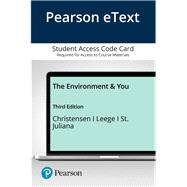The Environment and You gives you reason to be hopeful about environmental challenges. The authors draw on their pedagogical expertise and classroom experience to help you establish a reliable foundation in science. They also strive to inspire students like yourself, connecting the course to choices you can make as citizens and demonstrating the role science can play in influencing personal, community, and global environmental issues. The authors convey their belief that we can all change the world in directions that are truly sustainable and that you will be part of that process of change.
With the 3rd Edition, You Decide discussions provide complex environmental issues that prompt you to consider options and take a position. New Misconceptions?address common misunderstandings and push you to examine evidence that contradicts your opinions and ideas.
Pearson eText is an easy-to-use digital textbook. The mobile app lets you keep on learning no matter where your day takes you, even offline. You can also add highlights, bookmarks and notes in your Pearson eText to study how you like.
NOTE: This ISBN is for the Pearson eText access card. Pearson eText is a fully digital delivery of Pearson content. Before purchasing, check that you have the correct ISBN. To register for and use Pearson eText, you may also need a course invite link, which your instructor will provide. Follow the instructions provided on the access card to learn more.










